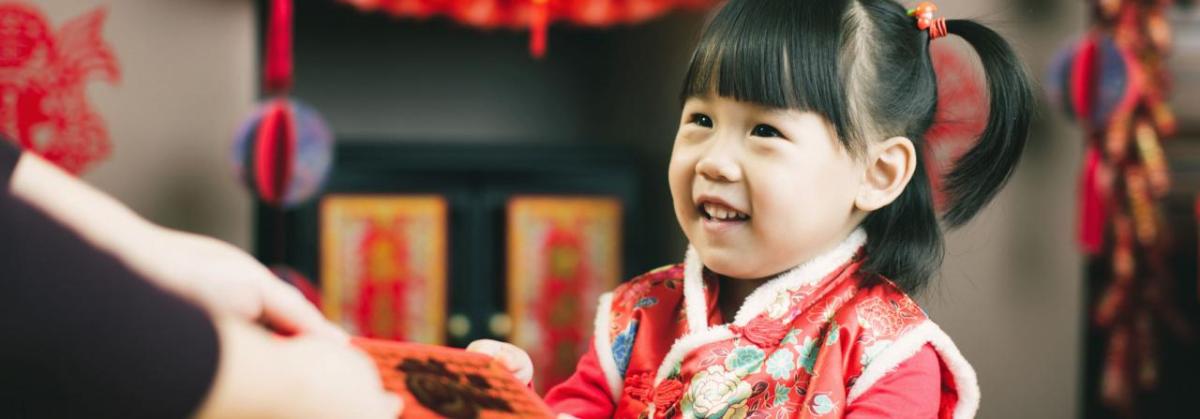Lunar New Year: A Meaningful Global Celebration
Twenty-five percent of people across the globe celebrate Lunar New Year, marking the time between old and new.

Originally published on Principal.Com
Growing up in Shanghai, Jingkan Gu soaked up the sights and sounds of Lunar New Year: dozens of relatives traveling hours to gather around the special dishes on his grandmother’s table, a house festooned with the holiday’s signature red decorations.
“I grew up in Shanghai in the 1980s when China was just starting to open its doors, and people were returning to the roots of why we celebrated the Lunar New Year,” says Gu, director of capital markets for Principal®. “There was this relative scarcity of material life, but we’d eat a big meal, and all be together. We’d sit around a small black-and-white TV, watch entertainment, and try to stay up late for the fireworks.”
Gu has adapted those childhood cultural traditions and impressed upon his young children in the United States the importance of the Lunar New Year. For Gu and 25% of the globe’s population,1 this centuries-long holiday is a chance to cement bonds with friends and family and usher out the old while welcoming the new.
Marking the Lunar New Year
The start of the Lunar New Year shifts from year to year, but it always begins on the first day of the first lunar month; the full celebration extends an additional 15 days. What typically stays constant are those traditions.
“I still take my parents to the market to buy flowers and food, eat sweet dumplings with my family, and prepare red pockets for my relatives—all things we did when I was a child,” says Jennifer Wong, senior manager of pension sales and distribution for Principal Hong Kong. Her memories and that routine are grounded first and foremost by a feeling of togetherness. “Lunar New Year is full of joy and laughter.”
Many traditions that guide people like Gu and Wong arose from myth and legend. One says that about 3,500 years ago, people were forced to hide from a monster that emerged every New Year’s Eve. One day, a boy scared him away with firecrackers, thus ushering in good luck. Other customs include:
- Traveling great distances to see family, typically for the Lunar New Year dinner. In China, the seven days starting with the Lunar New Year are a national holiday.
- Refraining from showering or sweeping until the end of celebrations, in order to preserve good luck.
- Gifting “lucky” money in red envelopes, or pockets, signifying good fortune. The color is also thought to scare away that monster.
- Eating dumplings, usually every day but absolutely on the morning following the new year when everyone has stayed up all night.
A celebration connecting humanity
Many who don’t celebrate the Lunar New Year have nonetheless heard of the zodiac animals associated with the holiday. For example, this Lunar New Year, which began January 22, 2023, is the year of the rabbit.
For Fei Li a marketing manager with Principal China, who was born in mainland China, the rabbit holds special significance: It’s the animal of her birth year. “According to tradition, I have red socks to keep bad luck underfoot, and I pray for peace and good luck,” she says.
Pre-COVID, her Beijing coworkers put up spring decorations and hosted a party, while her family typically played games such as mahjong to pass the twilight hours of the Lunar New Year. Technology (and time) has meant continually adapting those traditions for families such as Li’s, but what holds constant is using the Lunar New Year to think about "out with the old, in with the new,” she says.
At 19, Gu left China to attend Grinnell College in Grinnell, Iowa, an experience he calls “transformational.” “ It taught me that it’s both important to have an open and curious mind about what people from other cultures do, and maintain that cultural connectivity to my family heritage as an anchor,” he says. “We all do things differently.”
Five cities and three countries later, Gu joined Principal in Iowa, back where his U.S. journey began two decades ago. Today, despite the long distance and pandemic challenges, technology enables him to connect with parents and relatives still living in China. He’s also found a supportive global community at work. “Here, all cultures are celebrated and respected. I’ve had fun conversations with U.S. colleagues on the Chinese zodiacs, lovely Lunar New Year greetings in Mandarin from partners and clients overseas, and kind recommendations of new local Asian food spots to try from coworkers,” he says.
He’s also passing along traditions to his children. “You can shorten the distance both for family and for people with different cultures to build commonality about what we’re celebrating—family, the hope for good fortune, for example—to emphasize our shared humanity and have a more balanced view of the world,” Gu says. “While nothing compares to my childhood memory of Grandma’s new year cooking with families, being surrounded by such awesome people at Principal, I feel home.”
Read more about the commitment to global inclusion at Principal.
2691800-012023

